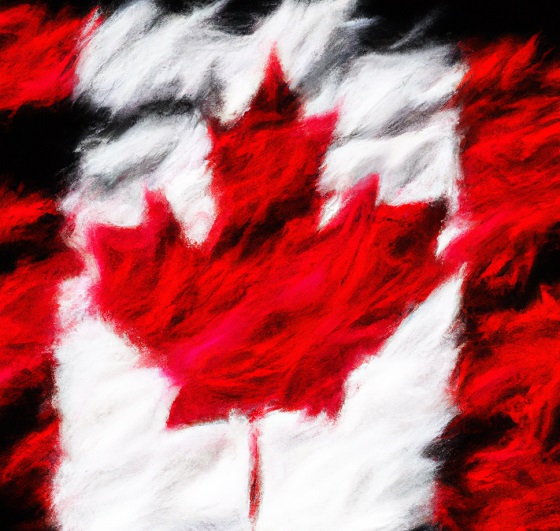Frontier Centre for Public Policy
Canada Fulfills the Dystopian Vision

From the Frontier Centre for Public Policy
By Lee Harding
The country our ancestors built is being torn down. The welfare state runs on massive deficits, increasing our public fiscal slavery. Cancel culture kills free speech. The government funds the Anti-Hate Network to oppose religious conservatives, which negatively stereotypes them.
Poet T.S. Elliot once wrote, “This is the way the world ends. Not with a bang but a whimper.” Canada has fallen but has all the illusion of being what it always was. Many Canadians fail to see a dystopian future foretold decades ago has arrived. Our institutions are failing us.
In Orwellian fashion, The Charter of Rights and Freedoms has transformed Canadian values in the pretense of upholding them. They eliminated federal laws that made Sunday a day of rest, forced the provision of abortion and euthanasia in the name of the security of the person, and banned prayer from city hall meetings in the name of religious freedom.
The pandemic cranked the judges’ distorted amp right up to 11. In B.C., Chief Justice Christopher Hinkson struck down public health orders banning protests, but quizzically maintained the ban on religious assembly. Elsewhere, the hypocrisy just continued, laws or no laws.
Ontario Premier Doug Ford and Prime Minister Justin Trudeau could bow the knee at Black Lives Matter protests that exceeded gathering limits, while those who did so for church services or rallies against mandates were prosecuted–or even persecuted. The Walmarts and Superstores were packed, while the churches and small businesses sat empty.
Doctors who prescribed ivermectin, one of the safest and widely effective drugs of all time, faced medical censure–even if their actions saved lives. Medical colleges became bodies that betray the profession’s values by banning medical opinions and the off-label use of drugs when it contradicts poor policies based on weak evidence.
The media, which should have been pushing back at this nonsense, went along with the charade as if it was the right thing to do. Any perspective that could foment doubt against the recommendations and policies of those in power was banned. Such is the practice of authoritarian countries, which is what Canada became.
As law professor Bruce Pardy has noted, Canada has shifted from the rule of law to the rule by laws. Here, legal systems manage the public and the law and courts fail to call the governments to account. A rally that’s permitted one minute can be trampled by the Emergencies Act the next, while donors to a protest see their bank accounts seized. Did you lose your job for refusing a vaccine? Too bad. Oh, and you don’t get EI either.
The pandemic and its fear subsided, but neither sober reflection nor an adequate reckoning arrived. People kept getting COVID after the vaccinations, yet some are getting booster shots to this day. Analysts such as Denis Rancourt, credit public responses, including vaccines, for worldwide excess mortality of 17 million. Yet, the bombshell falls like a dud, either ignored or diffused by dismissive “fact-checkers.” The life expectancy of Canadians dropped two full years and barely a shoulder was shrugged.
Even our elections fail to inspire confidence. In many municipalities, programmable computers count the votes and no one checks or scrutinizes the paper ballots. In other cases, paper ballots don’t exist–it’s all done on screen. A computer gets the trust a single individual would never receive.
The country our ancestors built is being torn down. The welfare state runs on massive deficits, increasing our public fiscal slavery. Cancel culture kills free speech. The government funds the Anti-Hate Network to oppose religious conservatives, which negatively stereotypes them.
Gender ideology, now entrenched in law and schools, is facilitating a wedge between traditional values and woke values and between parents and their children. It even challenges the objective truth of biological reality. Truth has become what we feel, overriding rational norms, facts, and our inherited society.
Like George Orwell’s 1984, if the government says 2 + 2 = 5, then that’s what it is, and anyone who fails to accept it becomes an enemy of the state. Orwell’s novel envisioned a time when false propaganda like “war is peace” and “freedom is slavery” would prevail. The dystopia has arrived. Anyone who refers to someone by their biological sex is accused of misgendering hate.
Unfortunately,the dark vision of Aldous Huxley is also unfolding. In 1958, the author of Brave New World Revisited predicted,
“By means of ever more effective methods of mind manipulation, the democracies will change their nature; the quaint old forms – elections, parliaments, supreme courts, and all the rest – will remain. The underlying substance will be a new kind of totalitarianism. All the traditional names, all the hallowed slogans will remain exactly what they were in the good old days. Democracy and freedom will be the theme of every broadcast and editorial. Meanwhile the ruling oligarchy and its highly trained soldiers, policemen, thought-manufacturers and mind-manipulators will quietly run the shows as they see fit.”
It’s especially sad to watch our elderly maintain trust in government and mainstream media narratives when the days they deserved it have left us. Like petrified wood, the forms of our institutions remain but their composition has entirely changed. Our democratic, legal, and media institutions, our schools and hospitals, are failing us badly.
Canada has fallen, but many Canadians can’t see it because there’s no rubble.
Lee Harding is a Research Fellow for the Frontier Centre for Public Policy.
Crime
How Global Organized Crime Took Root In Canada

From the Frontier Centre for Public Policy
Weak oversight and fragmented enforcement are enabling criminal networks to undermine Canada’s economy and security, requiring a national-security-level response to dismantle these systems
A massive drug bust reveals how organized crime has turned Canada into a source of illicit narcotics production
Canada is no longer just a victim of the global drug trade—it’s becoming a source. The country’s growing role in narcotics production exposes deep systemic weaknesses in oversight and enforcement that are allowing organized crime to take root and threaten our economy and security.
Police in Edmonton recently seized more than 60,000 opium poppy plants from a northeast property, one of the largest domestic narcotics cultivation operations in Canadian history. It’s part of a growing pattern of domestic production once thought limited to other regions of the world.
This wasn’t a small experiment; it was proof that organized crime now feels confident operating inside Canada.
Transnational crime groups don’t gamble on crops of this scale unless they know their systems are solid. You don’t plant 60,000 poppies without confidence in your logistics, your financing and your buyers. The ability to cultivate, harvest and quietly move that volume of product points to a level of organization that should deeply concern policymakers. An operation like this needs more than a field; it reflects the convergence of agriculture, organized crime and money laundering within Canada’s borders.
The uncomfortable truth is that Canada has become a source country for illicit narcotics rather than merely a consumer or transit point. Fentanyl precursors (the chemical ingredients used to make the synthetic opioid) arrive from abroad, are synthesized domestically and are exported south into the United States. Now, with opium cultivation joining the picture, that same capability is extending to traditional narcotics production.
Criminal networks exploit weak regulatory oversight, land-use gaps and fragmented enforcement, often allowing them to operate in plain sight. These groups are not only producing narcotics but are also embedding themselves within legitimate economic systems.
This isn’t just crime; it’s the slow undermining of Canada’s legitimate economy. Illicit capital flows can distort real estate markets, agricultural valuations and financial transparency. The result is a slow erosion of lawful commerce, replaced by parallel economies that profit from addiction, money laundering and corruption. Those forces don’t just damage national stability—they drive up housing costs, strain health care and undermine trust in Canada’s institutions.
Canada’s enforcement response remains largely reactive, with prosecutions risk-averse and sentencing inadequate as a deterrent. At the same time, threat networks operate with impunity and move seamlessly across the supply chain.
The Edmonton seizure should therefore be read as more than a local success story. It is evidence that criminal enterprise now operates with strategic depth inside Canada. The same confidence that sustains fentanyl synthesis and cocaine importation is now manifesting in agricultural narcotics production. This evolution elevates Canada from passive victim to active threat within the global illicit economy.
Reversing this dynamic requires a fundamental shift in thinking. Organized crime is a matter of national security. That means going beyond raids and arrests toward strategic disruption: tracking illicit finance, dismantling logistical networks that enable these operations and forging robust intelligence partnerships across jurisdictions and agencies.
It’s not about symptoms; it’s about knocking down the systems that sustain this criminal enterprise operating inside Canada.
If we keep seeing narcotics enforcement as a public safety issue instead of a warning of systemic corruption, Canada’s transformation into a threat nation will be complete. Not because of what we import but because of what we now produce.
Scott A. McGregor is a senior fellow with the Frontier Centre for Public Policy and managing partner of Close Hold Intelligence Consulting Ltd.
Business
The Payout Path For Indigenous Claims Is Now National Policy

From the Frontier Centre for Public Policy
By Tom Flanagan
Ottawa’s refusal to test Indigenous claims in court is fuelling a billion-dollar wave of settlements and legal copycats
First Nations led the charge. Now the Métis are catching up. Ottawa’s legal surrender strategy could make payouts the new national policy.
Indigenous class-action litigation seeking compensation for historical grievances began in earnest with claims related to Indian Residential Schools. The federal government eventually chose negotiation over litigation, settling for about $5-billion with “survivors.” Then–prime minister Stephen Harper hoped this would close the chapter, but it opened the floodgates instead. Class actions have followed ever since.
By 2023, the federal government had paid or committed $69.6-billion in 2023 dollars to settle these claims. What began with residential schools expanded into day schools, boarding homes, the “Sixties Scoop,” unsafe drinking water, and foster-care settlements.
Most involved status Indians. Métis claims had generally been unsuccessful—until now.
Download the Essay. (4 pages)
Tom Flanagan is professor emeritus of political science at the University of Calgary and a senior fellow of the Frontier Centre for Public Policy.
-

 Alberta2 days ago
Alberta2 days ago‘Weird and wonderful’ wells are boosting oil production in Alberta and Saskatchewan
-

 Business2 days ago
Business2 days agoCanada is failing dismally at our climate goals. We’re also ruining our economy.
-

 Alberta2 days ago
Alberta2 days agoAlberta to protect three pro-family laws by invoking notwithstanding clause
-

 Health1 day ago
Health1 day agoCDC’s Autism Reversal: Inside the Collapse of a 25‑Year Public Health Narrative
-

 Energy2 days ago
Energy2 days agoThe Carney Government is Hijacking the Phase “Energy Superpower” to Advance Their Agenda
-

 Crime1 day ago
Crime1 day agoCocaine, Manhunts, and Murder: Canadian Cartel Kingpin Prosecuted In US
-

 Health1 day ago
Health1 day agoBREAKING: CDC quietly rewrites its vaccine–autism guidance
-

 National1 day ago
National1 day agoPsyop-Style Campaign That Delivered Mark Carney’s Win May Extend Into Floor-Crossing Gambits and Shape China–Canada–US–Mexico Relations






